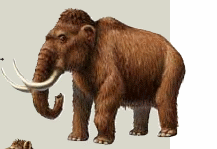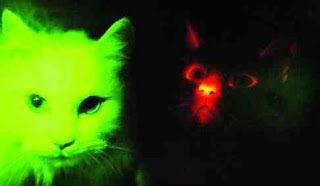
Soon after humans crossed the Bering land bridge into North America some
13,000 years ago, almost 75 percent of the continent’s large mammals (those
weighing more than 45 kilograms) disappeared (color). One of the goals of
Pleistocene rewilding is to restore some of these species or close proxies to the
American West. For example, the same species of lion and cheetah that once
lived in North America survive today in Africa; the African or Asian elephant
could substitute for the extinct mammoth; and Bactrian camels might stand
in for the extinct Camelops.
COPYRIGHT 2007 SCIENTIFIC AMERICAN, INC.
When The West Was Really Wild
Just in time for Christmas: Cloned cats that glow
by Reuters
South Korean scientists have cloned Turkish Angora cats with a red fluorescent protein produced by manipulating their genes, which makes them give off an eerie glow when hit by certain ultraviolet light.
A team lead by Kong Il-Keun, an animal cloning expert at Gyeongsang National University, said the cats would be used for genetic research.
The cats do not glow in the dark, but their ears, noses and other places where fur cover is minimal give off a red glow when hit with the ultraviolet light.
 This picture taken under ultraviolet light in a dark room shows a cloned Turkish Angola cat, right, whose genes were modified with a fluorescent protein, giving it a red fluorescent glow. A normally cloned cat of the same variety, at left, appears green in the ultraviolet light.
This picture taken under ultraviolet light in a dark room shows a cloned Turkish Angola cat, right, whose genes were modified with a fluorescent protein, giving it a red fluorescent glow. A normally cloned cat of the same variety, at left, appears green in the ultraviolet light. Choi Byung-gil, Reuters
The cats were born earlier this year, but the results of the procedure were only made public by the Ministry of Science and Technology this week.
Kong is a pioneer in South Korean in cat cloning.
South Korea, once a world leader in cloning and human embryonic stem cell studies, suffered a major setback after two papers on human embryonic stem cells by once acclaimed scientist Hwang Woo-suk were found to be based on faked data.
© The Calgary Herald 2007
Wikipedia Competitor Being Tested by Google
By MIGUEL HELFT
http://www.nytimes.com/2007/12/15/technology/15web.html?ref=business
SAN FRANCISCO — Google is testing a new Web service intended to become a repository of knowledge from experts on various topics, one that could turn into a competitor to Wikipedia and other sites.
If it attracts a following, the service could accelerate Google’s transformation from a search engine into a company that helps create and publish Web content. Some critics said that shift could compromise Google’s objectivity in presenting search results.
The service, called Knol, which is short for knowledge, would allow people to create Web pages on any topic. It is designed to include features that permit readers to submit comments, rate pages and suggest changes. However, unlike Wikipedia, which allows anyone to edit an entry, only the author of a “knol,” as the pages in the service would be called, would be allowed to edit. Different authors could have competing pages on the same topic.
Google said that a main idea behind the project was to bring attention to authors who have expertise on a particular topic.
“Somehow the Web evolved without a strong standard to keep authors’ names highlighted,” Udi Manber, vice president for engineering at Google, wrote in an announcement of the test Thursday evening on a Google corporate blog. “We believe that knowing who wrote what will significantly help users make better use of Web content.”
Mr. Manber said the goal of Knol was to cover all topics, from science to medicine to history, and for the articles to become “the first thing someone who searches for this topic for the first time will want to read.”
That is often the role played by Wikipedia pages, which frequently turn up at or near the top of results presented by Google and other search engines.
“I think Google is looking at the growth of sites like Wikipedia, that aggregate knowledge, and feels it has to play in that space,” said Danny Sullivan, a search expert and editor of the Web site Search Engine Land.
Several other services have taken different approaches in their efforts to become repositories of knowledge on various topics. They include Yahoo Answers, Squidoo, Mahalo and About.com, which is owned by The New York Times Company.
Despite the existence of these services, as well as countless free tools for experts and ordinary people alike to share what they know online, Mr. Manber said Google thought many people who possessed useful knowledge did not publish it “because it is not easy enough to do that.”
Google declined to make Mr. Manber or anyone else available to discuss Knol, saying the project was an experiment that like many Google tests, might never be opened to the public.
While many technology analysts and bloggers noted that Knol appeared to be a direct competitor to Wikipedia, Jimmy Wales, that site’s founder, shrugged off the potential challenge.
Mr. Wales said that Google’s service would encourage competing, opinionated articles on any topic, whereas Wikipedia strived for objectivity and had a single article per topic that represented the collective knowledge of its authors.
“I’m looking forward to seeing what it ends up looking like,” Mr. Wales said.
Knol and Wikipedia would be different in other ways. While Wikipedia is a not-for-profit and ad-free endeavor, Knol has a more commercial bent: Authors could choose to have Google place ads on their pages and would get part of the revenue.
“At some point, Google crosses the line, where they are not only a search engine, but also a content provider,” Mr. Sullivan said. Technically speaking, he said, authors, not Google, would create Knol pages. “But it matters how it appears,” he said. “I do a search on Google, I go to some place that Google hosts and I also find Google ads.”
What’s more, Mr. Sullivan said, Google’s goal of making Knol pages easy to find on search engines could conflict with its need to remain unbiased. Google already carries content generated by users in a variety of services, including YouTube, the photo storage site Picasa and Blogger.


